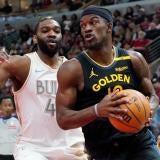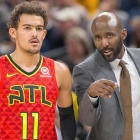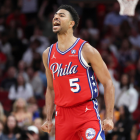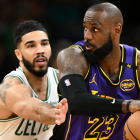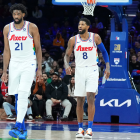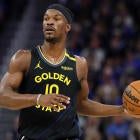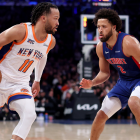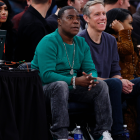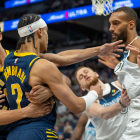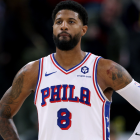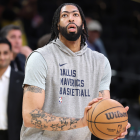LAS VEGAS -- Lloyd Pierce has all sorts of responsibilities as coach of the Atlanta Hawks, but hyping up his team isn't one of them. He doesn't like to talk about how many games they might win next season, and there is danger in prematurely raising expectations. Nonetheless, for a brief moment at Thomas & Mack Center, before taking his courtside seat to watch the Hawks' summer league team, he sounded a bit like the many writers and podcasters who have rhapsodized about Atlanta's young core. It all starts, he said, with the "special connection" between Trae Young and John Collins.
"You got a point guard who's really good at pick-and-roll and is a crafty and creative passer," Pierce said. "You got another guy who's dynamic in pick-and-roll because of his ability to get behind the defense to finish basically on good and bad passes and can absorb contact while in the air. Great passer, great roller. Great creator, great finisher. It's a naturally borne dynamic to have in those two guys."
The "extra element," he said, is the shooting around that duo. The Hawks know that Kevin Huerter can space the floor, and they expect draftees De'Andre Hunter and Cam Reddish to do the same. And as deadly as the Young-Collins pick-and-roll can be, their wings can create, too.
For those of us who love to talk about where the game is going, it is fashionable to praise Atlanta's front office, led by general manager Travis Schlenk. Young isn't just a flamethrower from deep, we'll say, he is a Steve Nash acolyte, already one of the best passers in the NBA. Did you know Collins essentially averaged 20 and 10 last season and hasn't even turned 22? And don't even get us nerds started on Huerter, who can shoot off the bounce *and* has great court vision. The nature of upside, though, is that it is not always realized. Pierce's job is to harness each player's talent, foster collective chemistry and guide the Hawks through inevitable ups and downs.
Every time he arrives at an arena or practice facility, Pierce wants to win the day. But the broader goal, he said, is creating a working environment that "elicits winning." Even when he is talking to a rookie about something as mundane as his pregame routine -- the trick is to do it at game speed without tiring yourself out -- he considers his work directly tied to the organization's overall vision. From the top down, Atlanta wants to be known as an A-plus franchise. Pierce sees the team eventually competing for multiple championships.
"The big picture is all I think about," Pierce said.
Pierce was hired largely because of his player-development background. At Young's pre-draft workout last June, he was on the floor in practice gear, picking up the point guard full-court. After shootarounds, Pierce sticks around to do individual skill work, just like he did as an assistant coach.
"Our whole coaching staff plays pickup and does all that," Huerter said. "You see your head coach doing it and getting sweaty and playing defense, there's a little bit inside that makes you want to do it, too."
Coaching, according to Pierce, is a combination of teaching and managing. He has a degree in business management, and it comes in handy when delegating responsibility, planning practices and facilitating team bonding. Pierce came to Atlanta from Philadelphia, where he was part of a staff that used an "effort chart" to evaluate hustle. The Hawks "have something similar," Pierce said, and he will tell players that they're "telling on themselves" when they sprint down the court on a fast break but don't display the same enthusiasm getting back on defense.
To get players in their early 20s to defend at a high level, Pierce said, you must first define high-level defense and show them what it looks like when done properly. The same goes for playing with pace, moving the ball and even the seemingly simple matter of effort.
"If you're a rookie and you come into a league, you think you play hard," Pierce said. "Then all of a sudden you're playing against Patrick Beverley. You see another level."
Unlike, say, the New Orleans Pelicans, Atlanta did not start its rebuild by trading a megastar for building blocks and picks, and its rotation is not balanced with playoff-tested veterans. Vince Carter, who is eight months younger than Pierce, provided wisdom and guidance as a reserve last season; now the coach is trying to empower Young, Collins and Huerter to be leaders.
"When you have leadership, you have ownership," Pierce said. "When you have ownership, you feel like not only are you accountable but you're a part of it and you've gotta be accountable for the other guys to be a part of it as well. That leadership-ownership connection is what I'm trying to educate those young guys in adapting. It's hard to say, 'Hey you're a second-year guy but you're also one of our leaders,' but it's the reality of where I am right now. So how do I help them?"
Every time Atlanta adds a player, Pierce asks himself what that player's ceiling is. Young became the Hawks' primary ballhandler immediately, and they will challenge him to grow as an off-the-ball threat. Hunter can do a bit of everything and could become a multipositional menace, but he's not going to wow crowds with ballhandling wizardry.
"De'Andre will never be the flashy player that Trae Young is," Pierce said. "Their skill sets are different. That doesn't mean he's less of a player or less of an impact than Trae. They're just going to do it differently."
When Pierce looks at his roster, he sees options. He doesn't know if he'll actually use the Young-Huerter-Hunter-Reddish-Collins lineup this season; what's significant is that it is a possibility. Atlanta is often compared to the early-stage Warriors, but Pierce pointed to the versatility of the team that beat Golden State in the Finals. The Raptors had to play multiple styles throughout the playoffs, and, while Kawhi Leonard was their go-to guy, they needed heroics from Kyle Lowry and Fred VanVleet to clinch the title. While Pierce's players are not as proven, he will trust them to make reads and make plays.
"You have to be adaptable," Pierce said. "You have to have the ability to play different lineups. You have to be able to go small. You sometimes need to go big. Sometimes you need to switch, sometimes you need to stay in coverage."
The outline of a winner is visible in Atlanta. To borrow a phrase from Pierce's former employer, though, trusting the process is easier in theory than in practice. As much as Pierce preaches consistency, good practice habits and gradual improvement, losses still test a team's resolve -- and the Hawks had 53 of them last season. One of them, in which they surrendered 43 first-quarter points and trailed by as many as 46, took place in Milwaukee on a Friday night in January. After the 144-112 beatdown, Pierce kept his locker-room speech short: he wouldn't overreact, and neither should they. They watched the film on Saturday, and on Sunday beat Miami by 24 points.
After the victory, Pierce told his players he wouldn't overreact, and neither should they. There would be film to watch the next day.
![[object Object] Logo](https://sportshub.cbsistatic.com/i/2020/04/22/e9ceb731-8b3f-4c60-98fe-090ab66a2997/screen-shot-2020-04-22-at-11-04-56-am.png)








